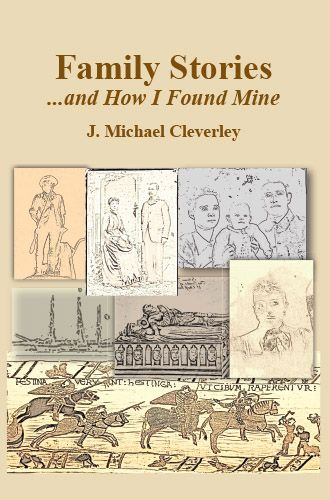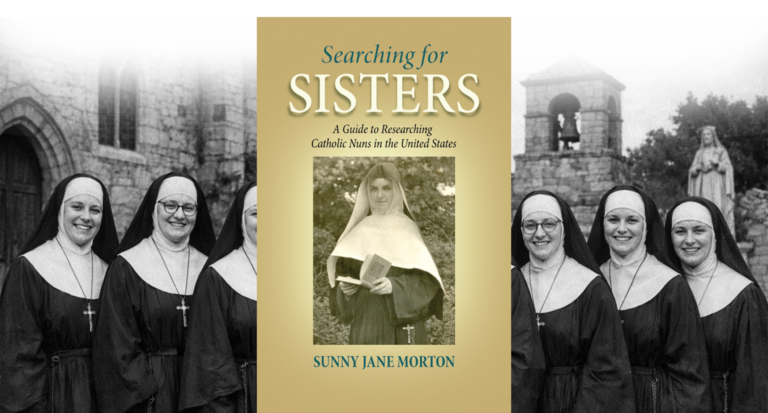
Family Stories . . . and How I Found Mine and the Challenges of Ancient Sources
J. Michael Cleverley’s new book, Family Stories . . . and How I Found Mine traces his family history from the present day to the time of William the Conqueror. Mr. Cleverley’s book not only recounts his family’s history but also explains how he discovered and assembled the story. Since the author was determined to produce a family narrative, as well as a pedigree of his forebears, Mr. Cleverley had to wrestle with the limitations imposed by sources that were many hundreds of years old. The following excerpt, taken from the first chapter, “The Wife of the Conqueror,” focuses upon Matilda of Flanders, William the Conqueror’s wife and the author’s ancestor, attests to the problems in relying upon a source from the 11th Century.
“The Wife of a Conqueror,” by J. Michael Cleverley
“When I began searching for stories about Matilda, the medieval account of William’s and Matilda’s engagement was the first one I came across. When I read it, I was both shocked and amused. It had all the makings of a fairy tale: the beautiful damsel, the brave prince or knight, some violence we do not easily understand, the couple falling in love, a magnificent wedding, and a happy-ever-after ending…
I had two questions about this family story. First of all, was it true? And then, what do we make of it? In seeking an answer to the first, I learned that we do not know about the tale’s authenticity. It has been told for 800 years, and that is a long time. However, the three chronicles where it first emerged were written 200 years after it might have happened, and that is a long time, too, especially in days when written histories were few and far between.
On the other hand, the fact that no one has disproved it during these 800 years makes it difficult to discount out of hand. After all, just because tales and legends have no documented proof does not necessarily make them false. Homer’s story of the Battle of Troy was told thousands of years before archeologists in the late 19th century made findings that suggested the battle actually took place, although perhaps not with all of Homer’s details and intrigues.
In pursuit of my stories, I saw early on a spectrum with “facts” on one side and “legends” on the other. As we peer through the dark spyglass of time, the line extending between the spectrum’s polar ends often runs ever so hazily. Sometimes “legends” re-surface as history when findings, such as Schliemann’s discovery of Troy, provide proof that mythological events actually occurred. On the other hand, “historical facts” are often disproven, not just because new information emerges, but because explorers with different perspectives arrive to interpret the events. As one historian once put it, “…facts do not compel us to believe one way or the other because the understanding of those facts will inevitably change.”
In family history, even something as clear cut as a parent-child relationship recorded in contemporaneous records may not always be accurate. Not long ago, orphaned children were adopted and raised by neighboring families. Census records might show them as children of the adopting family. Illegitimate births can also easily mask the true heritage of a child listed in the records. I quickly learned that collecting stories of our past is not an exact science. What appears as reality may not always be as definitive as we think.
In this case, there are enough details recorded at the time of William’s and Matilda’s match and marriage to venture the basic outline: William’s desire to marry a well-pedigreed wife, Matilda’s beauty and character, William’s coarse and aggressive nature, and their subsequent complementary and happy marriage. But what about his striking and throwing her to the ground when they first met, and her changing her opinion so profoundly about him? In our age, this may seem strange.
Something worth keeping in mind as we travel in search of family stories, is that their times were not our times. Yes, people were human and knew joy and sorrow, success and failure, love and hate, just like we see around us today. Their value structures were often different, however, and their priorities often diverge from our own. The way they experienced pain may have been different. Their faith in God and an afterlife was often stronger.
For example, until recently, people lived with death more intimately than we do. For them, the impact of a tragedy might often have been different from what it might be to us. A family could have ten children and lose several of them to an epidemic within a week or so of each other. I tell later the story about a family that lost their mother and two sisters while crossing the American Plains. How they found the strength for normal and happy lives afterwards, as they evidently did, was hard for me to grasp. In fact, many things in the past are hard to understand with today’s values as our reference points: public violence, corporal and capital punishment, social and gender roles, and how one’s inherited, but stagnant, position in society was taken for granted. The idea of social mobility to many of them was foreign.
It is easy for us to feel enlightened, and somehow morally superior to our family members who lived in the past. Many of them, however, might have felt exactly the same way about us if they had had a chance to see our day. They might, for example, easily scorn our secularism, the widespread devaluation of religion in our society, and many other common modern values. It is thought-provoking to list things we accept in our day as common and normal that they, in theirs, would find objectionable.
Historians often compare a journey back through history to a trip to an exotic foreign land. “The past is a foreign country: they do things differently there,” as one writer put it. Decades of traveling to and living in foreign countries taught me that people in different places often enjoy their culture and traditions just as much as I do in my own country, however different theirs are from mine. Travelers hoping to be welcome and to get the most from their visit must be respectful of the customs of their hosts. This is just as important when traveling to the foreign times of the past. If it is not my way, it is not necessarily the wrong way, it is just different, however hard that may be to understand. “
Recent Blog Posts




